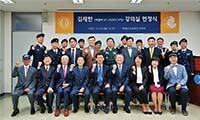By EDWARD WONG
BEIJING - Oakley Qiao had every reason to feel felt confident when he began his job hunt last September. He was a student at one of China’s top graduate business schools. He already had a few years of work experience. Students applying for jobs at the same time the previous year had gotten two or three offers by the winter, sometimes for a starting salary 20 times the average Chinese annual income.
But on January 20, Mr.Qiao walked away from the campus of Peking University without a job offer .
Most of his 100 classmates face the same problem, even though the school had invited recruiters to the campus every week since the fall. Mr.Qiao said he had handed out resumes to more than 50 companies.
“Everyone’s anxious,”he said.“The companies who come to the job fairs, they just come to give presentations, not to offer jobs.”
Anxiety is rippling through a generation of Chinese who had grown up thinking that economic prosperity was guaranteed them. The great boom in urban middleclass wealth over the past decade and a half is slowing because of the global financial crisis, and the job market for collegeeducated Chinese, even those with degrees from top universities here and abroad, has tightened.
So worrisome has the situation become that some students at Peking University, one of China’s most prestigious, are even talking about joining the army or becoming butchers. (A well-known alumnus recently made a fortune opening pork shops.) The anxiety level of the ruling Communist Party, whose legitimacy is pegged to maintaining economic growth, is rising in step with that of the frustrated workers and job seekers. Prime Minister Wen Jiabao said at a recent cabinet meeting that“this year’s employment situation is very grave,”according to a government report. Earlier, the government ordered stateowned companies not to lay people off.
The Chinese government reported that the growth rate for the final quarter of last year fell to 6.8 percent, bringing the rate for the full year down to 9 percent, the slowest pace in at least six years. Analysts say growth could slow to 5 or 6 percent this year, which would be the slowest pace for more than a decade.
Reliable unemployment statistics are hard to find. The official registered urban unemployment rate for the end of 2008 was 4.2 percent, up from 4 percent in 2007; it was the first time the official rate had risen after five consecutive years of decline.
“The figure looks all right, but the real situation could be much more serious, as migrant workers and newly graduated college students were not included in the government count,”Tang Min, deputy secretary of the China Development Research Foundation, told Xinhua.
The plight of college graduates is expected to get worse because Chinese universities are increasing their enrollments. Furthermore, the ranks of overseas Chinese who are returning to look for work are swelling because of the recession in the United States and Europe.
Of 5.59 million college graduates in 2008, an estimated 27 percent were unable to find jobs by the end of the year, according to the Chinese Academy of Social Sciences.
Last November, nearly one million students took the civil service exam to compete for government jobs, a jump of 25 percent over the previous year.
For the students, that meant the odds were dismal: every job opening in the government had an average of 78 applicants.
스마터리빙
more [ 건강]
[ 건강]이제 혈관 건강도 챙기자!
[현대해운]우리 눈에 보이지 않기 때문에 혈관 건강을 챙기는 것은 결코 쉽지 않은데요. 여러분은 혈관 건강을 유지하기 위해 어떤 노력을 하시나요?
 [ 건강]
[ 건강]내 몸이 건강해지는 과일궁합
 [ 라이프]
[ 라이프]벌레야 물럿거라! 천연 해충제 만들기
 [ 건강]
[ 건강]혈압 낮추는데 좋은 식품
[현대해운]혈관 건강은 주로 노화가 진행되면서 지켜야 할 문제라고 인식되어 왔습니다. 최근 생활 패턴과 식생활의 변화로 혈관의 노화 진행이 빨라지고
사람·사람들
more많이 본 기사
- 크리스마스 대형 폭풍… 침수·산사태 대비 ‘비상’
- [이민 단속] 새해에도 더 공격적 단속
- 취업비자(H-1B), 고연봉자 우선 발급
- [이민 단속] 여권 소지 시민권자들 증가
- [‘로드 레이지’ 한인 피살 현장 상세 상황] 끼어들기 시비가 비극으로… 차에서 내려 “쏴봐라” 언쟁
- 연방대법, 시카고 주방위군 투입 ‘기각’
- [성탄절 문 여는 곳은] 코스코·월마트 닫고… CVS는 영업
- 가난해서 흙 팠는데… ‘다이아’ 캤다
- 두 손 모아 성탄기도… “온 세상에 평화를”
- MC몽, 차가원 회장 충격 불륜 부인.. “채무 120억 당연히 이행”
- 퀸, 51년 전 ‘미발표곡’ 공개 녹음 뒤 앨범에 안 담긴 곡
- 차기 대선 선호도… 공화 ‘밴스’ ·민주 ‘뉴섬’ 선두
- ‘파워볼’ 열풍 계속… 오늘 잭팟상금 17억 달러
- 트럼프 “마두로 물러나라” 최후통첩
- 엡스타인 자료 추가 공개… “전용기에 트럼프 8번 타”
- ‘마약 혐의’ 남양유업 창업주 외손녀 황하나 경찰에 체포
- 내년 OC서 첫 이사회 및 신년회
- 온라인쇼핑과 반품, 그리고 그 이후
- SD 해군장병들 받을 보너스 2억여 달러 지역 경제 도움
- 한미가정상담소 미술심리 힐링
- 불체자 자진출국하면 지원금 3배로 ‘3천불’
- 정동원, 내년 2월 23일 해병대 입대..전역 예정일은 27년 8월 22일
- 미 해군 군함 명칭 전통 깬 ‘트럼프급 전함’
- 트럼프의 새 독트린 “미국을 다시 왜소하게”
- “트럼프 정부, 망명신청자 8천명 과테말라 등 제3국 추방 추진”
- 지평 넓히는 K-푸드… 라면·김치 이어 과자·스낵 가세
- “ATM기 사용하기 겁나네”
- 해외서도 극과극 반응’대홍수’, 넷플릭스 글로벌 1위 차지”SF 걸작 vs 최악”
- “경쟁력ㆍ맞춤형 금융 솔루션 제공”
- [미국은 지금] MAGA의 분열, 예견된 균열의 시작
- ICE 홈디포 급습 한인 체포
- 한인사회 등 봉사 앞장 SD 무용협회 종강식
- 발렌시아 한국학교 한국어 스펠링비 성료
- [남가주 6개 은행 전국 예금 현황] 1억달러 이상 예금고 지점 99개
- [미라클터치] “겨울철 건강 회복, 뼈에서 시작된다”
- [수요 에세이] 삶이라는 배를 타고
- 먹는 비만약 경쟁 치열 ‘위고비’ 미국 판매승인
- [지평선] ‘인간GPT’ 환각의 부작용
- “국악 아름다움 나눠요”
- “은·로빈후드·인공지능 주식에 집중 투자”
- 뚜레쥬르, 뉴욕 맨해튼에 직영 ‘매디슨 스퀘어 파크점’ 열어
- ‘평양무인기’ 김용현·여인형 추가 구속…법원 “증거인멸 염려”
- ‘계엄연루’ 추경호 첫재판…특검 “국민관심 커 신속재판해야”
- 잇단 트럼프 때리기에도…파월, 지지율 3부 요인중 최고
- ‘100억달러 수주’ 한화오션, 내년 FPSO 시장 노린다
- 내란재판부 설치법 이어 허위조작정보근절법도 국회 본회의 통과
- ‘세계한인대회’ 신설한다 한인회·한상·차세대 포괄
- 美, EU 전 집행위원 등 5명 입국금지… “미국 빅테크 표현 검열”
- 한국외대, ‘김재한 강의실’ 헌정식
- 미, 외국산 드론·부품 수입 전면 금지
1/5지식톡

-
 미 육군 사관학교 West Poin…
0
미 육군 사관학교 West Poin…
0https://youtu.be/SxD8cEhNV6Q연락처:wpkapca@gmail.comJohn Choi: 714-716-6414West Point 합격증을 받으셨나요?미 육군사관학교 West Point 학부모 모…
-
 ☝️해외에서도 가능한 한국어 선생님…
0
☝️해외에서도 가능한 한국어 선생님…
0이 영상 하나면 충분합니다!♥️상담신청문의♥️☝️ 문의 폭주로 '선착순 상담'만 진행합니다.☎️ : 02-6213-9094✨카카오톡ID : @GOODEDU77 (@골뱅이 꼭 붙여주셔야합니다…
-
 테슬라 자동차 시트커버 장착
0
테슬라 자동차 시트커버 장착
0테슬라 시트커버, 사놓고 아직 못 씌우셨죠?장착이 생각보다 쉽지 않습니다.20년 경력 전문가에게 맡기세요 — 깔끔하고 딱 맞게 장착해드립니다!장착비용:앞좌석: $40뒷좌석: $60앞·뒷좌석 …
-
 식당용 부탄가스
0
식당용 부탄가스
0식당용 부탄가스 홀세일 합니다 로스앤젤레스 다운타운 픽업 가능 안녕 하세요?강아지 & 고양이 모든 애완동물 / 반려동물 식품 & 모든 애완동물/반려동물 관련 제품들 전문적으로 홀세일/취급하는 회사 입니다 100% …
-
 ACSL 국제 컴퓨터 과학 대회, …
0
ACSL 국제 컴퓨터 과학 대회, …
0웹사이트 : www.eduspot.co.kr 카카오톡 상담하기 : https://pf.kakao.com/_BEQWxb블로그 : https://blog.naver.com/eduspotmain안녕하세요, 에듀스팟입니다…
케이타운 1번가
오피니언
 정숙희 논설위원
정숙희 논설위원온라인쇼핑과 반품, 그리고 그 이후
 파리드 자카리아 / 워싱턴포스트 칼럼니스트 / CNN ‘GPS’ 호스트
파리드 자카리아 / 워싱턴포스트 칼럼니스트 / CNN ‘GPS’ 호스트 트럼프의 새 독트린 “미국을 다시 왜소하게”
 김동찬 시민참여센터 대표
김동찬 시민참여센터 대표 [미국은 지금] MAGA의 분열, 예견된 균열의 시작
 임지영 (주)즐거운 예감 한점 갤러리 대표
임지영 (주)즐거운 예감 한점 갤러리 대표 [수요 에세이] 삶이라는 배를 타고
 이영창 / 한국일보 기자
이영창 / 한국일보 기자[지평선] ‘인간GPT’ 환각의 부작용
 조환동 / 편집기획국장·경제부장
조환동 / 편집기획국장·경제부장 AI로 가속화되는 노동시장 개편
 민경훈 논설위원
민경훈 논설위원‘크리스마스 캐롤’과 산타 클로스
 정재민 KAIST 문술미래전략 대학원 교수
정재민 KAIST 문술미래전략 대학원 교수 [정재민의 미디어풍경] 적과의 동침, 협력하며 경쟁하기
 김영화 수필가
김영화 수필가 [화요칼럼] 단호박의 온기
1/3지사별 뉴스

‘연방하원 도전장’ 척 박 예비후보 후원모임
연방하원에 도전장을 낸 척 박(한국명 박영철) 예비후보 후원 모임이 지난 18일 열렸다. 척 박의 부친인 박윤용 뉴욕주하원 25선거구 (민주)…
‘경찰 무력사용지침 갱신 의무화’ 입법 초읽기

‘올해는 ICE 이민자 체포 광풍의 해’
올 한해동안 버지니아와 메릴랜드, DC 등에서 연방 이민당국에 체포된 사람이 1만명이 훌쩍 넘는 것으로 조사됐다. 또 미 전국적으로는 22만명…
“ATM기 사용하기 겁나네”

연말 ‘로드레이지’ 비극… 한인 총격 피살
연말을 맞아 도로 위에서 순간적으로 벌어진 운전 중 시비가 40대 한인 가장의 총격 피살 비극으로 이어졌다. 워싱턴주 레이시 경찰국과 서스턴 …
엡스타인 파일 공개 다음날 트럼프 사진 삭제…야당서 탄핵 경고

오늘 하루 이 창 열지 않음 닫기 























































.png)


댓글 안에 당신의 성숙함도 담아 주세요.
'오늘의 한마디'는 기사에 대하여 자신의 생각을 말하고 남의 생각을 들으며 서로 다양한 의견을 나누는 공간입니다. 그러나 간혹 불건전한 내용을 올리시는 분들이 계셔서 건전한 인터넷문화 정착을 위해 아래와 같은 운영원칙을 적용합니다.
자체 모니터링을 통해 아래에 해당하는 내용이 포함된 댓글이 발견되면 예고없이 삭제 조치를 하겠습니다.
불건전한 댓글을 올리거나, 이름에 비속어 및 상대방의 불쾌감을 주는 단어를 사용, 유명인 또는 특정 일반인을 사칭하는 경우 이용에 대한 차단 제재를 받을 수 있습니다. 차단될 경우, 일주일간 댓글을 달수 없게 됩니다.
명예훼손, 개인정보 유출, 욕설 등 법률에 위반되는 댓글은 관계 법령에 의거 민형사상 처벌을 받을 수 있으니 이용에 주의를 부탁드립니다.
Close
x